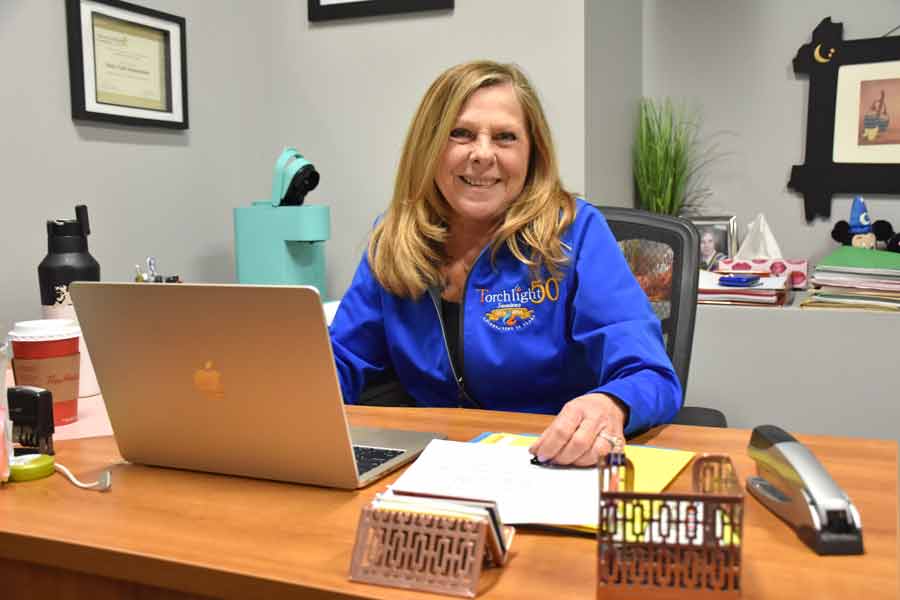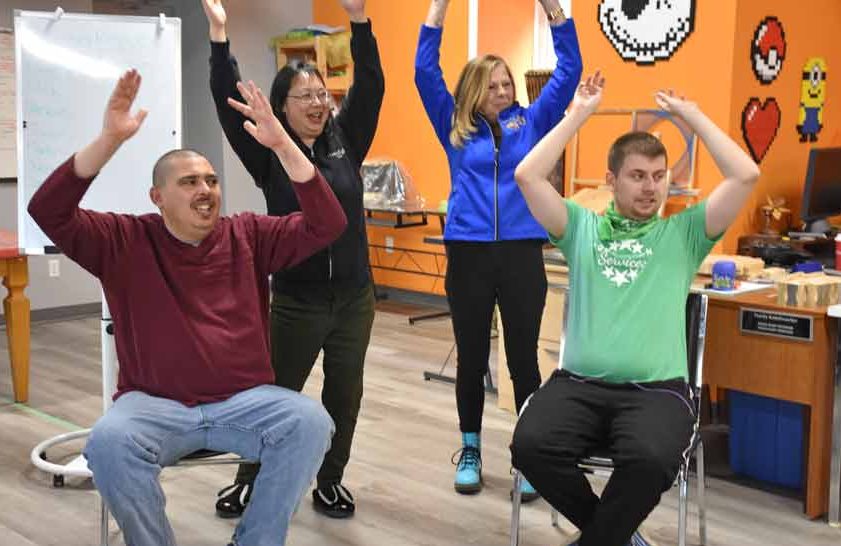GUELPH – Torchlight Services turns 50 this year and that’s cause for celebration, says executive director Patty Coté-Duncanson.
It’s also cause for reflection on the enormous changes that have occurred for the agency, which now provides day programs for people with developmental and intellectual disabilities.
That’s not how Torchlight began, Coté-Duncanson said as she offered a tour of the facility at 78 Carden St., right across the street from the Guelph Central Station bus terminal.
Torchlight began in 1974 as an agency that provided paid work for people with disabilities.
“The idea was it would give people with disabilities something to do,” Coté-Duncanson said.
“It also provided a workplace where they were accepted. And they could have their own spending money.
“They could do excellent work if given the opportunity.”
The agency found contracts with local businesses for piecework – simple assembly of items or packaging nuts and bolts to be included with other products, for example.
The agency was paid for the contract and that covered overhead costs for the building. There was also enough for the workers to be paid a stipend.
In 1980, Torchlight started its Community Options program, where staff helped clients with resumes and getting jobs in the community.
“It was good, but it was hard on staff,” Coté-Duncanson said of Community Options, noting some clients had mental health issues and didn’t always show up for work.
It became increasingly difficult to find workplaces that would take on these clients.
But over time there was a general shift in thinking on how to treat people with developmental disabilities and in 2015 the province began transitioning away from sheltered workplaces.
By 2019, agencies that had not transitioned were shut down.
“Some people thought these sheltered workspaces were little sweat shops. They weren’t ever that,” Coté-Duncanson stressed.
“Our clients felt productive. They were happy to go to work. But someone complained, and it blew up from there.”
Coté-Duncanson said 2018 and 2019 were tough years.
“If we didn’t transition properly, we would be shut down. So we had to let go of our contracts,” she said.
“We had to tell people they could no longer work here. It was a difficult time.”
The Community Options program ended as well, and the agency started looking for a new home. It moved to Carden Street in 2021.
Now Torchlight runs day programs for people with developmental disabilities at its new downtown location, and participants pay a fee to attend.
Broadly, the programs teach skills for independence, active living, social opportunities and community engagement. But daily they include the interests and wishes of participants as much as possible.
“We are so proud of it now,” Coté-Duncanson said. “We went through such a hard time with the transition. We thought we’d never recover. But we did.”
The day programs cost $35 per day but Passport funding – moneys provided by the Ministry of Children, Community and Social Services to individuals with developmental disabilities – can be used to cover the cost.
On a chilly day in April, the place was pumping and the music thumping as members of the Heartbeats Club engaged in some exercise. There was lots of laughing and cheering.
On that same day a small group was on an outing to visit a fish shop – not quite the same as visiting Marineland, which was what the group originally wanted to do, but participants were satisfied with the substitution.
Other outings include swimming, nature hikes, bowling and occasionally they take in a show at the River Run Centre.

Torchlight Services has had some rough patches over its 50-year history, but is on firm ground now, says executive director Patty Coté-Duncanson. Photo by Joanne Shuttleworth
“We take a holistic approach,” explained program coordinator Kim Court. “The focus is getting participants into the community on their outings.”
And it’s also to provide activities participants want to do, she said.
So there’s a stocked kitchen with multiple cooking stations. Participants learn to make every aspect of a meal, rather than working in an assembly line, and then they eat the meal together.
There are games and movie nights. There’s woodworking and other crafts in the basement, where participants in the Ignite program can make things to sell.
They set up their booth at local markets and events in town. They also sell items from Torchlight.
Martin Kuttelwascher oversees the woodworking program. It’s not a full workshop, but there are saws and drills, paint and sandpaper, and a healthy donation of reclaimed wood for projects.
Some projects are suggested by participants; others come from staff.
Back in April they were making doll-size Adirondack chairs. The project allowed some to work the saws and drills, some to assemble the pieces once they were cut, and others to paint and do other finishing work. Participants rotate through the various jobs.
“The idea is to learn the basics,” Kuttelwascher said. “We’re always trying to come up with new ideas.”
Participants make and sell cards, their woodworking projects, and with a couple of sewing machines at the site, they also sew bags and scarves to sell.
Participants of Ignite get to keep the money when items are sold.
Coté-Duncanson said the agency has some new board members and is hiring more staff as there are now 60 participants in the day programs.
Most are in Guelph, but residents of Wellington County are welcome if they can get themselves to the site. Coté-Duncanson said there are a few out-of-towners who attend regularly.
Finally, after a tumultuous few years, the agency is back on firm ground, she said.
“But many people still don’t know we exist.”
So to celebrate its 50th anniversary, Torchlight is rolling out the welcome mat to the community at large. It is holding an open house on June 15 from noon to 4pm at 78 Carden St.
There will be food, music, tours of the building, demonstrations, and a whole lot of fun, officials say.
Torchlight is holding a 50/50 raffle and issuing a special 50th anniversary cookbook, for which it is seeking advertisers.
For details on all Torchlight events and programs, visit torchlightservices.ca or its Facebook page, or email info@torchlightservices.ca.




